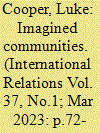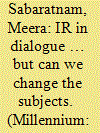|
|
|
Sort Order |
|
|
|
Items / Page
|
|
|
|
|
|
|
| Srl | Item |
| 1 |
ID:
189985


|
|
|
|
|
| Summary/Abstract |
Drawing on the concept of uneven and combined development this article critically interrogates Benedict Anderson’s theory of the ‘imagined community’ through an historical investigation into the English-realm-cum-British-empire. Placing its rise in the context of the conflicts of Post-Reformation Europe, it identifies vectors of combined development (money, goods, ideas, people) which shaped the formation of new imagined communities. These post-Reformation struggles were not defined by nationality but subjecthood, which saw ‘the realm’ displace the monarch as an object of rights and duties. The 18th century rise of British nationalism was a response to the long crisis of subjecthood (1639–1688). However, this emergence was uneven and non-linear, such that it co-existed as a political imagination with continued belief in – and political support for – subjecthood. Ironically, given its latter-day mythology, the American Revolutionary War was fought to protect subjecthood under the Crown from subordination to the British nation and its parliament.
|
|
|
|
|
|
|
|
|
|
|
|
|
|
|
|
| 2 |
ID:
105934


|
|
|
|
|
| Publication |
2011.
|
| Summary/Abstract |
In an effort to reconceive the conduct of 'dialogue' within world politics, it is necessary for us to find new subject-positions from which to speak. This article develops a typology of six distinctive intellectual strategies through which 'decolonising' approaches to social theory can help rethink world politics by bringing alternative 'subjects' of inquiry into being. These strategies include pointing out discursive Orientalisms, deconstructing historical myths of European development, challenging Eurocentric historiographies, rearticulating subaltern subjectivities, diversifying political subjecthoods and re-imagining the social-psychological subject of world politics. The value of articulating the project in this way is illustrated in relation to a specific research project on the politics of the liberal peace in Mozambique. The article discusses a number of tensions arising from engaging with plurality and difference as a basis for conducting social inquiry, as well as some structural problems in the profession that inhibit carrying out this kind of research.
|
|
|
|
|
|
|
|
|
|
|
|
|
|
|
|
| 3 |
ID:
185244


|
|
|
|
|
| Summary/Abstract |
Avoidance of civilian casualties increasingly affects the political calculus of legitimacy in armed conflict. “Collateral damage” is a problem that can be managed through the material production of precision, but it is also the case that precision is a problem managed through the cultural production of collateral damage. Bearing decisively on popular perceptions of ethical conduct in recourse to political violence, childhood is an important site of meaning-making in this process. In pop culture, news dispatches, and social media, children, as quintessential innocents, figure prominently where the dire human consequences of imprecision are depicted. Children thus affect the practical “precision” of even the most advanced weapons, perhaps precluding a strike for their presence, potentially coloring it with their corpses. But who count as children, how, when, where, and why are not at all settled questions. Drawing insights from what the 2015 film, Eye in the Sky, reveals about a key social technology of governance we have already internalized, I explore how childhood is itself a terrain of engagement in the (un)making of precision.
|
|
|
|
|
|
|
|
|
|
|
|
|
|
|
|
|
|
|
|
|